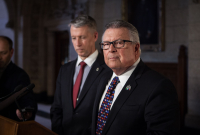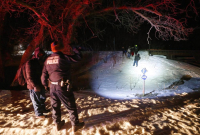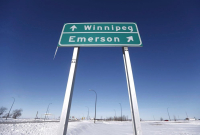Support strong Canadian climate journalism for 2025
A Liberal election promise to overhaul the way asylum claims are handled has been postponed indefinitely despite rising numbers of people seeking refuge in Canada putting the system at risk, The Canadian Press has learned.
One of the options on the table, multiple sources have told The Canadian Press, is rejigging the historic Immigration and Refugee Board, and giving some of its authority over to the Immigration Department itself.
But those advocating for the government to do something before backlogs threaten the integrity of the system say they are running up against a Liberal government seeming to have lost interest in spending any more money or political capital to help asylum seekers.
The starting point is the designated country of origins system, which determines how fast asylum claims are heard based on where they are from — a system that should, in theory, help weed out unfounded claims faster.
Internal evaluations have shown that hasn't quite worked, and the system has drawn the ire of refugee advocates for creating a two-tier approach that includes unworkable timelines for hearing cases and their appeals. Elements of the program have already been struck down by the Federal Court.
The Liberals had been on the cusp of doing away with it, going even farther than their original promise to use an expert panel to determine which countries belonged on that list.
But a planned January roll-out was postponed after the election of U.S. President Donald Trump and the subsequent Liberal cabinet shuffle that saw a replacement of the federal immigration minister.
Then in March, as the issue of illegal border crossers dominated global headlines and Question Period, plans to repeal the designated-country-of-origin scheme were scrapped again, sources said.
They haven't been rescheduled, even as the IRB itself has been among those saying the system needs to go as a way to ease the pressure.
"It would simplify our life from a case management point of view,” chairperson Mario Dion said in an interview with The Canadian Press in March.
"I don't have a political view."
The Liberals do, observers said.
When they came into power and moved to make good on a promise to resettle 25,000 Syrians, the government believed it had broad public support for refugees, said immigration lawyer and refugee advocate Lorne Waldman.
Things have changed.
"The concern at the centre is that support has dissipated significantly because of a series of factors, the most important one being the emergence of Donald Trump," he said.
"And I think the concern is amplified by the Conservative leadership race where you have many of the candidates taking a very anti-immigrant posturing in their campaign."
When asked, a spokesman for the prime minister's office said they were not behind the delay in the DCO overhaul, but that it was rescheduled by the department.
A spokesman for Immigration Minister Ahmed Hussen said only that the department continues to review the policy.
Claims have been rising steadily since the fall of 2015, but the issue shot to attention when hundreds of people began illegally crossing into Canada from the United States earlier this year. The Liberals have been under pressure from both Conservatives and the NDP to act, albeit in different ways, but so far haven't done anything.
If backlogs build in the system, the government will find itself in the exact same situation that led to the DCO being instituted in the first place — long waits for decisions that inadvertently lure those who have weaker claims to come to Canada, because they can work while they wait for a decision and get some health care in the meantime.
The IRB is aware of the problem and has instituted reforms, including allowing claims from Syria, Iraq, Eritrea and as of June 1, Afghanistan, Burundi, Egypt, and Yemen to be decided without a hearing.
Those countries were selected because claims from there have high acceptance rates, there is a high volume of them and most are generally not complex.
Sources say claims like those are among the ones that could go to the Immigration Department, as opposed to the IRB, for adjudication. The idea is fraught with difficulty.
There's a big difference between the work the department ordinarily does and the work refugee judges do, said Vancouver immigration and refugee lawyer Peter Edelmann.
"It's very different from an individual perspective in terms of the stakes and from a constitutional perspective in terms of the law to make a fast decision on an . . . application for a skilled worker than it is to send someone back where they're at risk of being tortured and killed," he said.
The very reason the IRB was established in 1989 was because of a Supreme Court hearing saying refuge claimants required an oral hearing, leading the government to establish the arms-length quasi judicial tribunal.
Giving bureaucrats a say in refugee determination risks politicizing the system, said Sean Rehaag, a professor at Osgoode Hall law school who follows the IRB's decision-making process.
Imagine the Canadian government is in the middle of difficult NAFTA negotiations and had to decide on whether or not to expedite a particular group of Mexican claims, he hypothesized.
For the civil servants on the file, there would be extraordinary pressure, and in reality, the current number of claims doesn't invite the need for dramatic change, he said.
"Refugee decision making is only a tiny fraction of the Canadian government's budget and they can make the so-called crisis go away by adequately funding the IRB," he said.





Comments